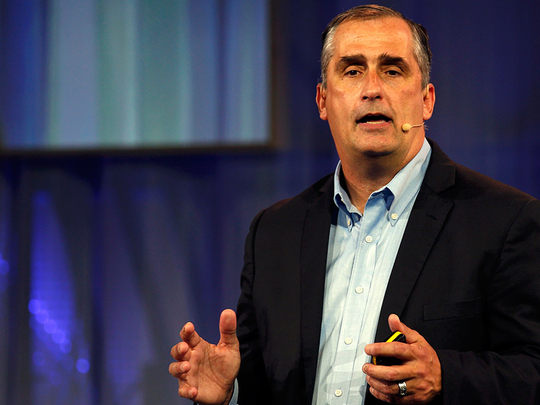
Barcelona: Intel CEO Brian Krzanich unveiled a new set of powerful low-cost mobile chips to help it catch up with its rivals in the smartphone and tablet markets.
Intel is displaying some of the latest devices and solutions across various technology sectors at Mobile World Congress being held in Barcelona from March 2-5, from security to wearables to network virtualisation.
He said the new chips will enable it compete more effectively in the smartphone space.
“Intel focused more on the tablet segment as tablets were eating into the PC segment. So we got there quickly with the right product and the right chip. The tablet market is a bit mature now. I would rather get in there with the right product and the right silicon. So I’m willing to take my time,” he said.
Intel sold 40 million tablet chips last year. But the company has gotten its chips into far fewer smartphones and it still has a long way to catch up with mobile-chip leader Qualcomm and MediaTek. It is still the leader in personal computers and data centres.
The chip manufacturer announced two mobile chips — Atom x3 series (code-named SoFIA), Intel Atom x5 and x7 processor series (code-named Cherry Trail) for tablets and two-in-ones and five-mode Intel XMM 7360 LTE Advanced solution, with support for up to Category 10 and download speeds of up to 450 Mbps.
SoFIA is a 64-bit processor with 3G or LTE connectivity.
“We are bringing the benefits of integrated Intel architecture and wireless communications to customers, including the China technology ecosystem, with greater velocity. Twenty companies, including Asus and Jolla, have committed to delivering Intel Atom x3 designs,” he said.
He outlined how Intel is working with vendors to transform network infrastructure with standardised hardware and software. “All of these factors are driving a transformation of the network to accelerate the delivery of new personal computing experiences, services and capabilities in a safe and secure manner. Intel is one of the only companies in the world that can provide solutions end-to-end for the full spectrum of mobility.”
Companies like Asus, Dell, Acer, HP, Toshiba and Lenovo have already committed to deliver devices on Cherry Trail chip. The first devices are expected to be in the market in the first half of this year.
He said that Intel was late into the mobile space but it is catching up fast with rivals and it is one of the few companies to deliver solutions end-to-end, for devices, the network and the cloud.
Intel is working with companies like Alcatel-Lucent, Ericsson on data centre platforms and with Huawei on cloud platform.
“The evolution of the mobile platform and growth of smart and connected devices has led to increased demand for data protection on those devices,” he said.
Samsung’s new S6 and S6 Edge and LG’s new smartwatches will have the latest anti-malware built into the devices from its McAfee arm.
Krzanich announced that new customers like Brightstar, Deutsche Telekom and Prestigio to its new True Key technology to address password issues by using facial identification and fingerprints.
Krzanich showed a sneak preview of the Dell Venue 10 tablet, featuring a detachable keyboard and Intel RealSense snapshot technology targeting consumer and business users.












